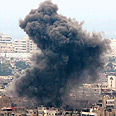
War view
Photo: Reuters
In the current round of violence with militant Palestinian organizations and Hizbullah, the government and the IDF are saying they want to restore Israel's deterrence vis-à-vis these two organizations – deterrence that supposedly has been lost.
But thinking about the conflict and belligerent ways of dealing with it through the use of the idea "deterrence" is frighteningly outdated. Israel hasn't deterred its enemies since 1967.
Myth of deterrence
Israel deterred neighboring countries as long as those countries had no interest in instigating a war they didn't really need and the results of which were unclear.
After capturing Sinai and the Golan Heights in the Six Day War, Egypt and Syria lost critical territories. They were deterred from attacking Israel outright, so they made due with a pseudo war, a war of attrition.
This did nothing to change Israel's stance, Egypt bypassed the war to get the Sinai back with a different kind of war, which started on Yom Kippur 1973. That attack thoroughly shook Israel's concept of security.
Bypassing deterrence
From here, we learn that when we have successfully deterred an enemy – the enemy has bypassed the deterrence, more successfully than the first time around. So we learn that deterrence, especially successful deterrence, will always be short-lived.
Since 1973 Syria has been deterred from outright war with Israel in the Golan Heights. Therefore, Syria fights Israel from Lebanon, first using Yasser Arafat's Fatah group, then moving on to Hizbullah. That war has exacted a price from Israel no less than the toll of the Yom Kippur war.
Against non-political entities like the Palestinians or Hizbullah, deterrence is even less effective, because they see their struggle in absolute terms and because their organizational structures are disorganized to the very core.
They are led by moderates, at least in Palestinian terms, that it could be possible to negotiate with.
But under but the political organizations they lead are not so moderate, and they give support to the armed organization that is subordinate to it and that considers extremism and violence a guiding light,. Under certain circumstances, these organizations are prepared to cease their fire, should such a move benefit the group. Under the armed wing there are and will be smaller, much more radical organizations, etc.
The logic behind this structure is to ensure that no one is subservient to anyone else. Therefore, anyone who is deterred, out of choice or out of lack of choice, leaves the arena and modus operandi open to more radical factors. That's what happened with Yasser Arafat, and more recently with Mahmoud Abbas.
Subversive advantage
Studies of conflicts in Africa have shown that even when a government adopted a policy of genocide against a minority, other armed groups continued to fight the army. For them, continuing the conflict became a goal, even when genocide was going on all around.
One of the characteristics of subversive organizations is the ability to learn quickly, usually quicker than state apparatus – political and military alike. When the Palestinians lost their ability to ambush Israelis, they developed suicide bombs. When this ability disappeared, they built Qassam rockets and dug tunnels.
Every tactic that has been deterred has been followed by by-pass tactics that usually represent an escalation. Therefore, strong military reactions do not deter, and even if they do succeed – it is only for a short period of time, to be followed by a new model that will take the army time to figure out how to fight it.
In short, restoring Israel's deterrent ability with punishing blows doesn't promise much, even if it gains us some time, even if it seems that time allows us to breathe easy.
Strive for attrition
So what should we strive for? Instead of deterrence – attrition. Attrition means unremitting pressure on an enemy, in all areas and using all possible means, pressing armed groups and far lesson civilians, because they cannot press and deter the extremists in their midst. This pressure should not be subject to negotiation, except for temporary tactical needs.
The advantage of attrition is that it doesn't allow the enemy to learn, or at least it slows down this process. It also dims their power and increases their losses. The down side is that the initiative is not gained for free. Sometimes the attacker himself becomes worn out.
The results of the first and second intifadas point to the fact that Israeli society can withstand attrition no less than the enemy, perhaps even better. Israel now has three options to deal with the Palestinians: Negotiate for a permanent status agreement, unilateral moves, and leaving the status-quo in tact.
I think each of these options will require a war of attrition, because even after achieving an agreement that is acceptable to both sides, we will have to fight will all our might.
So, too, with respect to Hizbullah: Quick solutions quickly dissipate. Attrition is not a quick solution, but it requires patience and unrelenting consideration.
Dov Tamari is an IDF brigadier general (res)















